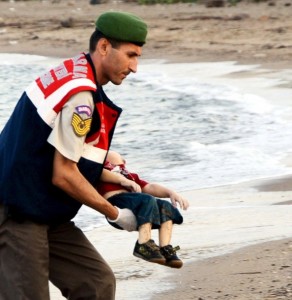A SYMBOL COMMANDING CHANGE IN CANADA

The image of Alan Kurdi’s tiny, lifeless body on the shores of Bodrum, Turkey commanded the world’s attention. The three-year-old immediately became the symbol of the dire situation facing Syrian refugees, displaced from their homes by civil war. His tragic story bore significant weight in the transformation of the world’s reception of Syrian refugees.
Three-year-old Alan, and his older brother, Ghalib Kurdi, aged five, are believed to have been born in Kobani Syria, where they were cared for by both parents. Alan’s father, thirty-nine-year-old Abdullah was employed as a barber in Kobani, while Alan’s mother, thirty-five-year-old Rehanna, worked as a seamstress. During Syria’s civil war, the family had made two attempts to escape to the island of Kos, in Greece, with aspirations of coming to Canada. On the third attempt, carried out on 2 September 2015, the family sought refuge in an overcrowded dinghy set for Kos. The dinghy, an inadequate inflatable device designed to carry only eight people, was in fact occupied by sixteen persons, and set to travel four miles from the shore of Bodrum to the island of Kos. The dinghy capsized between the waters of Greece and Turkey, taking the lives of Alan, Ghalib, and Rehanna. Alan’s tiny body washed ashore, images of which have been repeated throughout world as a symbol of the urgency and distress facing displaced Syrians. Abdullah buried his family in their hometown of Kobani, in Syria, where supporting mourners joined him.
Since the death of his family, Abdullah has lost motivation in his quest to come to Canada, and is now working to open a charity in northern Iraq for refugee children. In a holiday message, Abdullah demanded countries to welcome Syrian refugees.
Abdullah’s sister, Tima Kurdi, resides in British Columbia, Canada. She assisted the family by sending money to help finance the family’s escape, and it was decided the monies would pay smugglers and facilitate access to the dinghy. The Kurdi family paid over $5,000.00 for the four seats reserved on the ill-destined dinghy. Abdullah’s brother, Mohammed Kurdi, has recently been scheduled to arrive in Canada with his wife and five children on 28 December 2015. He will be reunited with Tima in British Columbia.
The Tragedy of Alan Kurdi Commands Change
The tragic image of Alan Kurdi’s lifeless body generated a surge of support for Syrian Refugees in Canada. Alan’s image transformed the focus of Canada’s election campaign. Canadian leaders made promises and took steps in consideration of the Syrian refugee crisis. Canada has reacted to include the planned welcome of over 50,000 Syrian refugees into Canada.
Other changes ensued. The terminology originally used to describe displaced Syrians shifted from migrants to refugees following the publication of the picture, with the difference between the two terms being heavily scrutinized. The term migrant did not capture the adversity facing Syrians. The term refugee more adequately captured the truth of the despair facing Syrians during this time.
On 9 December, 2015, Prime Minister Justin Trudeau, accompanied by Kathleen Wynn, greeted the first two Syrian families to arrive in Canada as part of refugee sponsorship. The families were greeted by ministers of immigration, health and defence, mayors, and extensive airport personnel. The families were vested by staff with winter attire, including coats, mittens, hats, boots and gloves. As these families prepared to be greeted, Prime Minister Justin Trudeau advised his assembled staff that the refugees arriving from that flight would walk out not as refugees, but as permanent residents of Canada, bearing social insurance numbers, health cards, and opportunities to become full Canadians. On making this statement, he elaborated:
“This is something that we are able to do in this country because we define a Canadian not by a skin colour or a language or a religion or a background, but by a shared set of values, aspirations, hopes and dreams that not just Canadians, but the people around the worlds share. This matters, tonight matters, not just for Canada, but for the rest of the world.” [emphasis added]
The Jamkossian family was the first family emerging through processing on 9 December, 2015, and described Canada as paradise, in their escape from hell and suffering. They were greeted by Prime Minister Justin Trudeau who assured them that Canada was now their home.
More than four million people have fled Syria since the commencement of the civil war, and approximately 250,000 people have been killed. More than 400,000 refugees have breached Europe’s borders by sea, while the Missing Migrants Project suggest that 2,898 have died trying. The image of Alan Kurdi has spawned public engagement and elicited concern and compassion as to the degree of suffering and difficulty endured by the displaced Syrian population. When I think about Canada’s position in accepting the Jamkossian family and Syrian refugees into Canada, when I think about community involvement supporting sponsorship, and when I think about Prime Minister Justin Trudeau’s words, I think of another, timeless set of words:
“You are the change you wish to see in this world.” — Mahatma Gandhi
Thank you Canada, for being that change.
